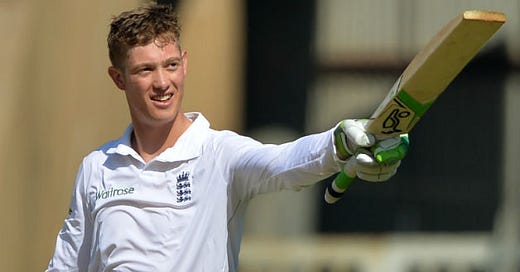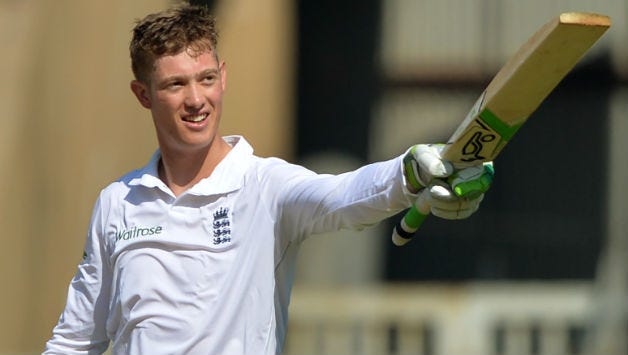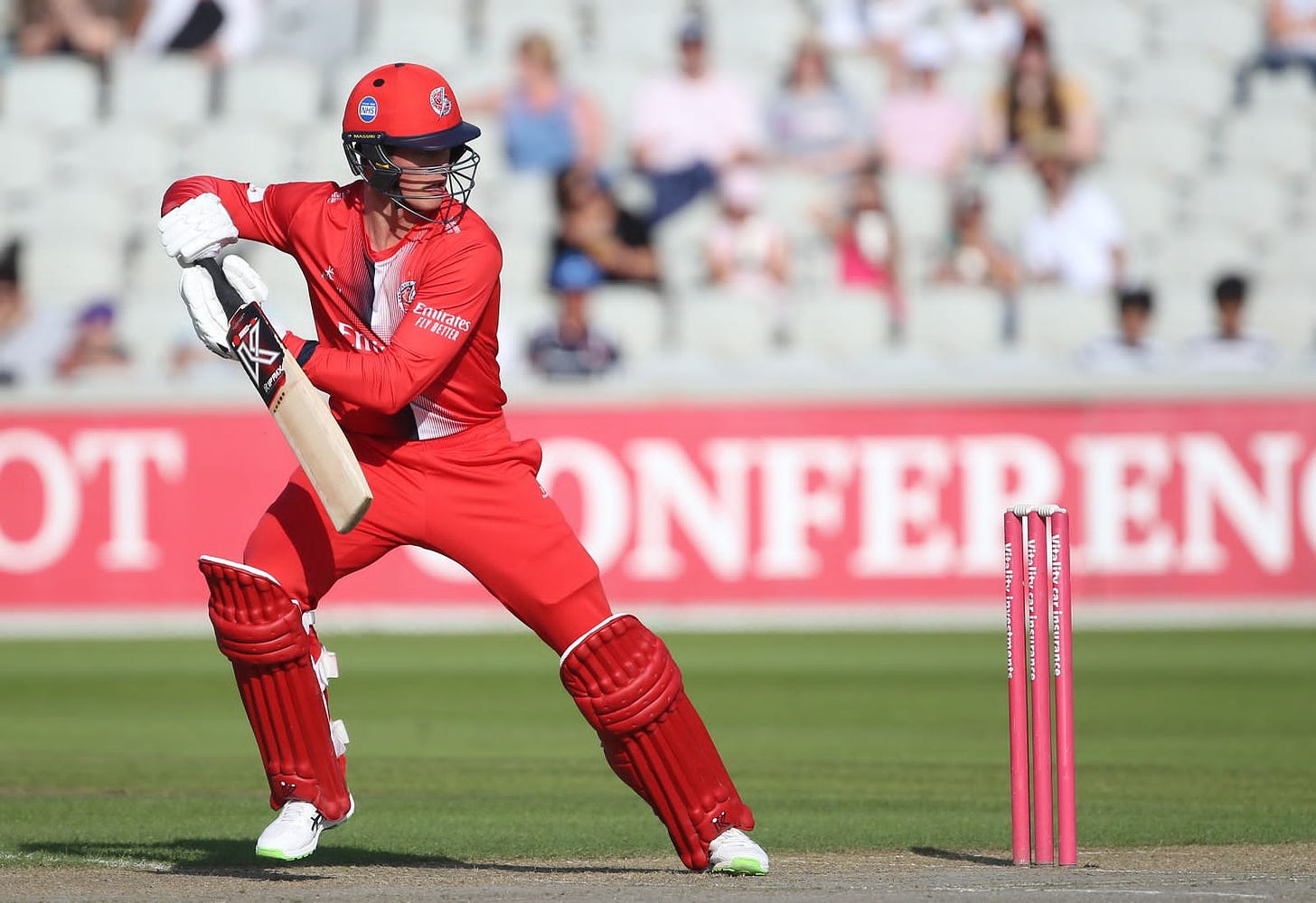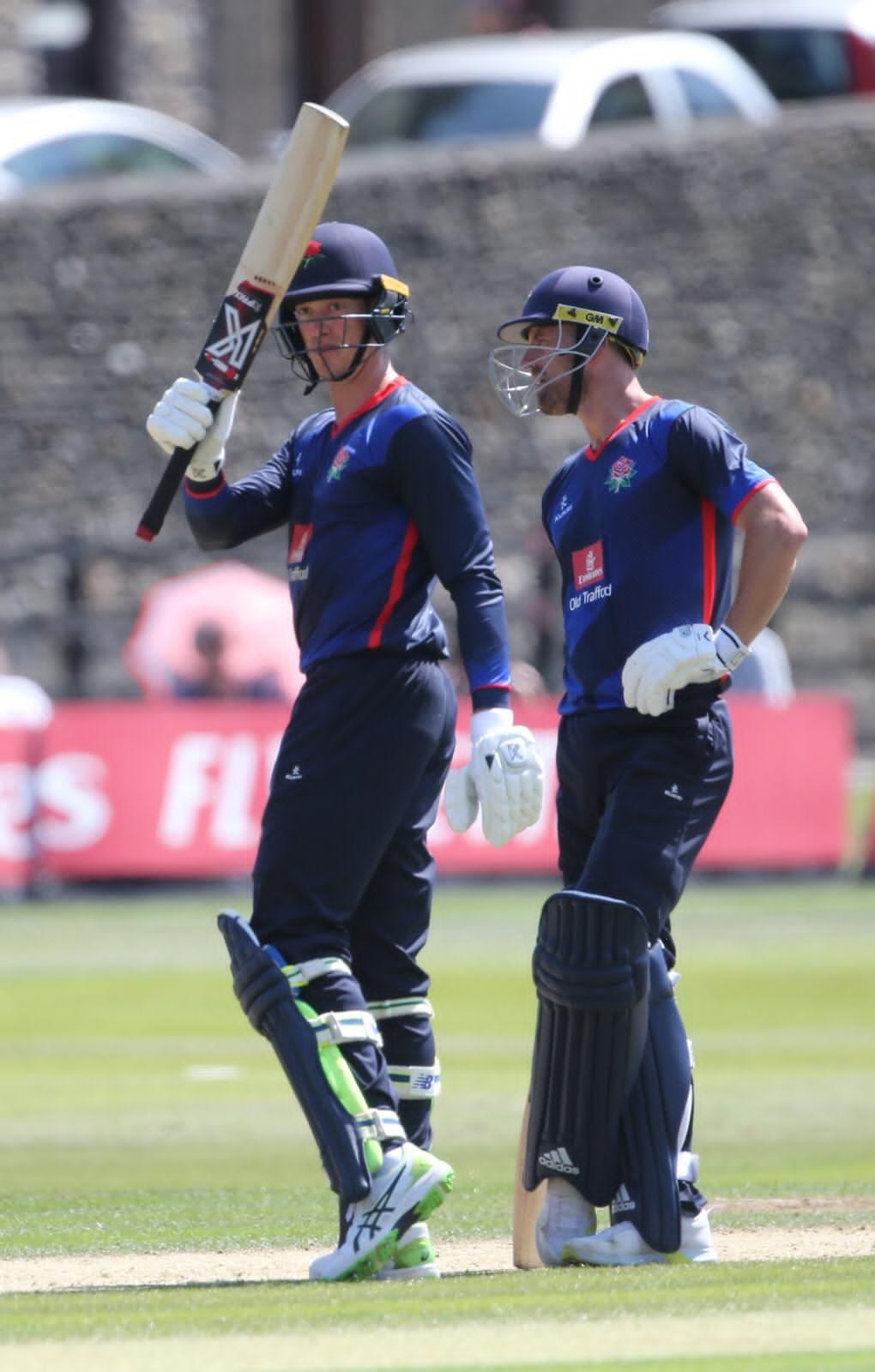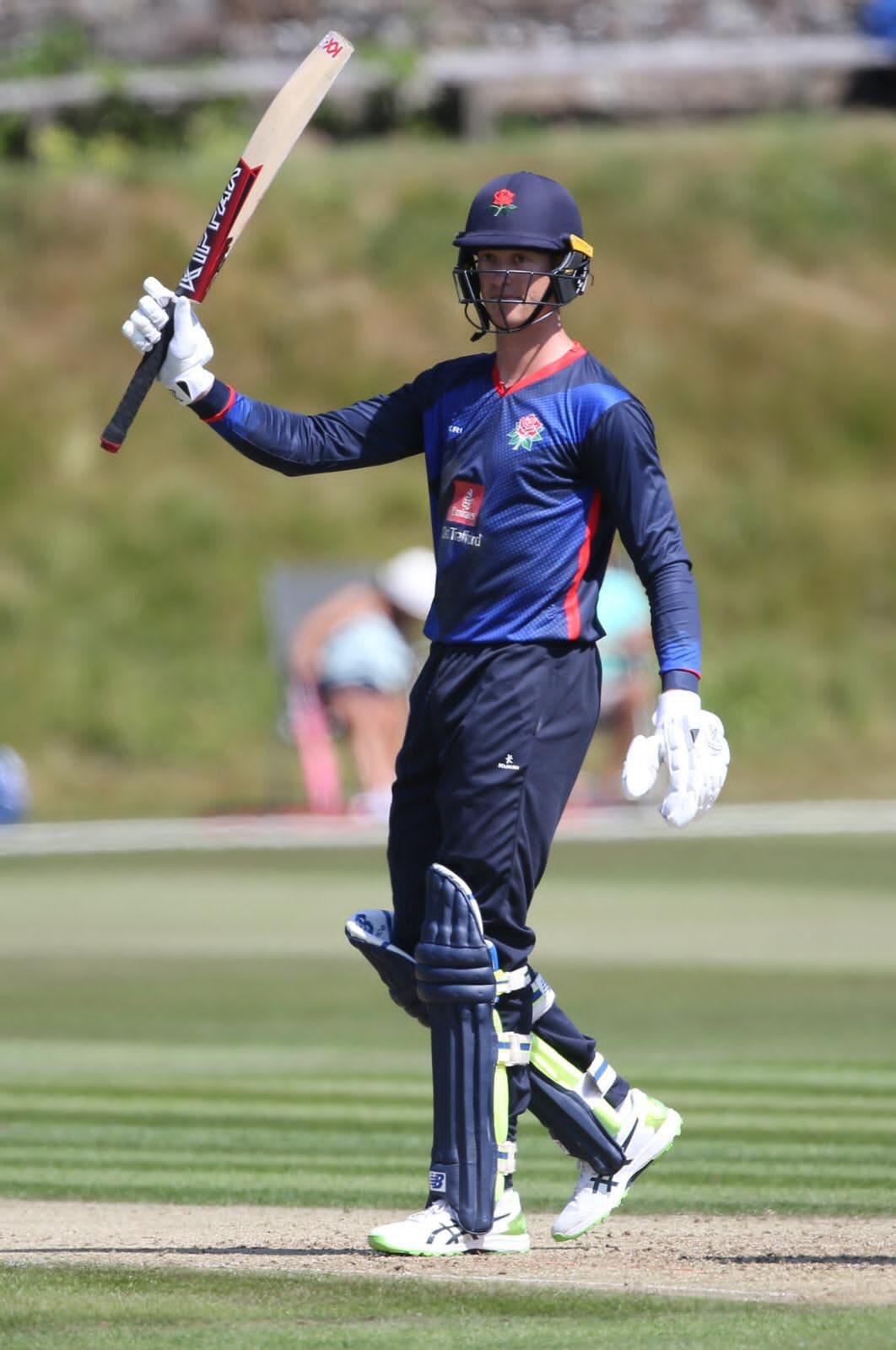Yadav tosses it up outside off. Keaton leaves the delivery well alone. He is in the 90s. Yadav flights another one, but Keaton knows better and he leaves this one too. He has spent about five weeks working very hard on how to play spin on doctored surfaces, under the guidance of Andy Flower, the lessons are still fresh in his mind.
As Yadav goes back to his mark, the Wankhede Stadium is silent. Cemetary quite. For a stadium as big as the Wankhede, it can be unnerving to have the crowd this quiet. Keaton Jennings knows what this silence means, they disapprove of his innings, it puts England in a strong position.
“When we were 70 for nought, and the crowd sort of went dead,” says Keaton as he relives the innings. “Jadeja was on and Kohli sort of turned around to the crowd like sort of flapping his arms as if like to try and rile them up. And honestly, the crowd went ballistic. I looked at Cookie at the other end, I just shook my head at him, and he just started laughing.”
Alistair Cook’s laugh helped him retain composure.
Keaton looked at Yadav as he prepared to come in with his next delivery. In the 90s every delivery is an event, the fielding team ramps up the pressure and try to force you into making a mistake as you try to rush to a century. But then Keaton realises that he also cannot be too defensive, that could be the end of him.
"I can't go forward and nick one and get out. I've got to get to this milestone,” he thinks to himself. “How many times am I going to get a Test 100?"
Yadav flights another one and Keaton Jennings reverse sweeps it. Andy Flower would be proud. Jennings looks up and watches the ball run to the boundary, and he tells himself, "That's four, that's a 100." But, not for the first time during his innings, the crowd goes flat, and he has to do a double-take at the screen to make sure that he has actually reached the milestone.
And in big bold words the confirmation is there, he has become the 19th England player to score a Test century on debut. A surreal moment for the young man, a wide smile on his face.
You can hear the sound of a machine from outside, there is always work being done, clefts being made, logs being cut down to size. The building resembles a farmhouse shed, with a side entrance. As you walk in there are crates, steel drives and steel containers, those ones that are used to ship goods overseas, they are converted into wood drying rooms. Then you see the woodworking machinery.
The floor is strewn with wood chippings, as you would expect. And because it is a bat making factory, you will not miss the clefts stacked, probably, six to 10 feet high. These ones are waiting to be sanded down before they are dried out. It’s exactly what you would expect a family-owned bat making factory to look like. There is an upstairs shop.
This small family-owned factory is one of Keaton Jennings’ favourite places. It’s situated about 45 minutes from his home, and he visits whenever he can.
“It’s nice, small and homely,” says Keaton Jennings.
That is one of the reasons why Keaton enjoys the relationship he has with Kippax bats, it is a small family-owned enterprise. He knows everyone who works there and they know him too. It’s not as if there are many employees at the factory, you can count them all on one hand. He enjoys having a chat with them without getting in the way, and they are happy to share their time with him, he is part of the family now.
“I think sometimes, especially when you play professionally, you can form a relationship with sponsors, that becomes just delivery of kit or that there's no sort of personal touch,” says Keaton.
Coming from a close-knit family, Kippax represents everything that he believes in. His family is spread out all over the world, his parents are in Mauritius, his uncle is in Zurich, his brother is in South Africa and other relatives are in Australia. But, despite this much distance between them, they keep in constant touch, Keaton hardly goes a day without chatting with his father.
Kippax was started by Peter Kippax in the 1970s. Peter Kippax comes from a family with a deep love for cricket. Though no one from the Kippax family has played international or County cricket, they have a love for the game that spans generations. From Peter’s father, Horace, who played club cricket from the 1930s. Peter who inherited his father’s talents also started his career with the Yorkshire Colts. His two sons Christopher and Simon also inherited the talents and love of the sport. Everyone works in the family business.
This is one of the things that Keaton Jennings has in common with his bat sponsors, cricket in his blood. Keaton is a second-generation cricketer, his father, Ray Jennings, and uncle, Kenneth Jennings, had illustrious First Class careers. His older brother, Dylan, also played First-Class cricket.
“That is the environment that I grew up in,” says Keaton. “Cricket is the sport that I had the most exposure to and naturally I took to it. There was no prodding or nudging from my father for me to pursue it. It's never been like, ‘You have to play and let’s got to the nets to do this, to do that.’ My dad's forced me to do one thing and that was studying. When I came over to England, that was his only, sort of, foot down moment, ‘You have to get a degree,’ he ordered me.”
A good number of cricketers have abandoned or put their education on hold as they pursue their dream of becoming professional (and possibly international) cricketers. Tabraiz Shamsi abandoned his university studies to be able to move from Johannesburg to Durban. He had been studying accounting with the University of Johannesburg when Dolphins offered him his first professional contract. Here is what he was faced with: continue with education - while trying to earn a spot at Lions - or accept the contract that Dolphins was offering.
It was his first professional contract, a goal he had been working towards for years. It was a life-changing opportunity. This was the fulfilment of a lifelong dream, an opportunity that he would probably never get again. He chose his career.
That is the price of the dream, it doesn’t allow you to have other dreams.
“I later studied for a marketing degree while I was playing in Durban and Maritzburg,” says Shamsi. “I have also done a bunch of courses through UCT on business management and property development.”
It’s a risk worth taking if things work out, but then the numbers of those who manage to carve professional careers are extremely low. And even if they do make it as professionals and scale the mountain to the top and become international cricketers, there is still a life to be lived after retirement. Not all ex-cricketers can have post-playing careers as coaches and commentators, there is a finite space.
"A lot of times athletes tend to focus on this very short term and forget that there is going to be this long life afterwards," says Kirsten van Heerden, a sports psychologist who works with a lot of cricketers. One of her passions is to remind cricketers that there is life after cricket and that they can and must have other dreams outside of their sports careers.
Ray Jennings was worried that his son, being young, might forget about all else as he went after his dream. Ray Jennings understood his son’s passion for the sport, it’s a passion that he had and still has himself. He also knew how fiercely driven Keaton is. It was the same drive that he had noticed in 8-year-old Keaton just before he felt it was justified to buy the boy his first proper bat.
“My dad thought I was taking cricket a bit seriously, so he got me a decent bat,” he reminisces.
The bat was a GM Purist.
“I absolutely loved it,” says Keaton. “I absolutely loved the maroon stickers that it had. I remember Trescothick used it at the time and Tres was one of my heroes.”
And since then, Keaton had been punching above his weight. He was consistently playing against older kids. He was not daunted but enjoyed competing against bigger, stronger and quicker kids.
Enoch Nkwe, who coached Keaton at the Gauteng Under-19 side, and then later at SA Under-19, was mindblown at how so far ahead of his peers he was when it came to understanding the game. Keaton had an unexpected mature outlook, which is one of the reasons why Enoch made him captain the Gauteng Under-19 side at Coke Week, the nationals. That year, Nkwe and Keaton ended Gauteng's 10-year trophy drought.
"He had a high level of professionalism. He understood early on that if he wanted to make it in cricket and in life, he needed to be disciplined in certain areas," says Enoch Nkwe.
The respect is mutual. Keaton Jennings when speaking of coaches who have had a huge positive impact on his development, besides his father, Keaton points to Enoch Nkwe and Andy Flower first.
Enoch describes him as a quiet cricketer who quietly went about his business, doing what's needed, and then trying to do more. He always pushed himself. And the result was that Keaton played with consistency, scored runs consistently. And this was good for Enoch who wanted more than just a leader for that season, he wanted someone who would set an example to the next captain. He was a captain earmarked to leave a legacy, and he did that.
"He was very mentally strong from early on. He worked hard on his technical game, but his biggest strength was his mindset,” says Enoch. “He supported that with very good physical training, so he was very fit. Very disciplined. In matric, he wanted to achieve a distinction in every subject and he wanted to achieve distinctions in cricket as well."
So, Ray knew how focused and disciplined his son was on making his cricket dream come true, but he didn’t want Keaton’s academics to suffer in the process. Keaton has always been academically smart, another thing that Ray Jennings knew. With his matric results, Keaton Jennings could have gone on to study medicine.
Anyway, Keaton Jennings left South Africa at 18. He had very little with him. A bat, some cricket gear and a bag of clothes.
“I remember arriving at Durham train station, it was freezing. Jeez, it was cold, there were no leaves on the trees, it was that cold. It was nothing like the Joburg winters that I was used to,” he laughs. “I had to learn a lot of things quickly because there was no one to look after me, it was all on me.”
Many cricketers who left South Africa in the years before and around the same time as he did, it was the height of the Kolpak years, they did so because they felt that they were not getting enough opportunities to play. Keaton was younger, his career was still starting, and he had the luxury of foresight. The emerging trend made him realise that he could be one of those players in the future. Opportunities were scarce.
“I didn't want to look back in 10 years, 15 years time and go, ‘I wish I tried something, or I wish I'd been given an opportunity,’” he says. “I felt in England with 18 counties, if I wasn't good enough, as a player, I could handle that for my own mind's sake. I could handle the fact I'm not good enough. But I couldn't handle not being given an opportunity to have a career, essentially and perform.”
Keaton felt that by being proactive he would not leave himself in a woe is me position should things fail to work out for him in the future. All things considered, he has avoided the scenario that he was afraid of at 18. He has had the opportunity to play international cricket, he has played Test matches at Lord's, MCG, Colombo, South Africa.
“I've lived essentially what is every boy's dream,” he says. “Thankfully, I don't have to ask myself, ‘What if?’”
All because he was willing to take the risk of going to Durham with no terms at 18.
“There were no real terms really,” he shares. “I just came over and joined the Academy. It was literally, ‘Just come over and play some cricket, and let's see what happens.’"
During his first two years at Durham Cricket Academy, Keaton managed to have a dual life, learn his trade and continue with his university studies with Unisa. The move was hard on him as a young man, fortunately, he made friends quickly and the academy’s head coach took him under his wing. However, as his career progressed, his studies fell behind.
This is normal with a lot of professional athletes, 3-year degrees take up to 5 or years to complete, athletes whom I have spoken to who have done this all share the same story - it takes longer to complete the studies. And even then it is a taxing undertaking that requires a lot of discipline and dedication.
“I got to the point where international cricket took off and I had to miss exams and fell behind. Well, if I'm honest with myself, I made excuses not to do it,” Keaton laughs. “I got to the point where I'd finished 75% of it in 2018.”
Keaton wasn’t impressed with his conduct towards his studies. Not because his father wanted him to finish his degree, but because it was an unfinished challenge. Keaton is not one to leave things half done, and the harder the challenge, the harder he goes for it.
One thing about being a Jennings, they are a very competitive lot, very critical of themselves and each other. Very close-knit and very competitive and self-critical. They are always striving to be the best that they can be at things, constantly pushing the limits of their abilities.
“My brother does ironman now, and my dad is quite competitive when he plays golf,” he shares.
During the lockdown, when there weren’t too many people around golf clubs, Ray Jennings would play rounds alone. But he wasn’t happy just going out there and whacking balls alone, so he devised a way to make it competitive even when he was playing alone. He would play with two balls, white and yellow, and play white versus yellow.
“One of my biggest struggling points as a youngster and getting older has always been an internal pressure,” says Keaton. “In everything I do, there is an internal level of perfection that I want to maintain.”
Keaton Jennings loves a good challenge, which is one of the reasons why he enjoys professional cricket, no two overs or two days are the same. There are so many unexpected things that come with competing in a cricket match. It is this love of challenges that has him working on his bowling. He has been working a lot with Graham Onions, making the necessary adjustments, always adding a new string to his bowl.
“They say that if your bowling average is less than your batting average, then you are an allrounder. So I am an allrounder,” he smiles.
It’s always the thrill of a challenge. The challenge of creating good dishes is one of the reasons why he loves cooking - besides the eating, of course.
“I think I put quite a lot of pressure on myself to perform and do well in everything that I do,” he says.
And that is one of the reasons why the spectre of an unfinished bachelor’s degree bothered him so much. In 2019 he decided to finish it in the winter and just went flat out. He emerged on the other side with an undergrad in BCom Accounts, and immediately afterwards he took on another academic challenge, going for an MBA.
“As soon as I completed my undergrad, I stupidly thought to myself, ‘You know what I'm studying, let me keep going and sign up to do a masters in business administration,” he smiles. “I get the most enjoyment out of going after a challenge. Whether that's playing golfing as my dad or trying to create new food, I love cooking and trying new things. And there's always that little bit of like, competitive challenge or try to seek something out. That motivates me.”
When he made his debut, Keaton was more anxious over the possibility that he would mess up the words to the national anthem and not the fact that he was playing at one of India’s biggest cricket stadiums. If anything, he was more excited about the playing, that was the fun part for him, the challenge of it all. In fact, he was so excited that on the morning of Day 2 he woke up at 5 am in a panic, afraid that he had missed the team bus to the grounds.
Keaton Jennings is always trying to get stronger, get smarter, get savvier, and keep learning.
“I think it's probably tied into not wanting to stand still,” he says.
But, as he grows older he has a new challenge that he is now striving for, to allow himself to fail. He realises that if he is to be better, failure has to be part of the process.
Keaton is really happy with the way things have turned out, how could he not be? He scored a century on debut, in India, facing guys that include Ravichandran Ashwin. He got to meet his idols, play with some of them and against others - he is even friends with Marcus Trescothick. He listens to a guy called Deko, has travelled around the world and sings Jerusalema every morning.
“If I were to retire today,” he smiles, “you know, I have lived 10 years as a professional cricketer, I will be very, very happy with the choices that I have made.”
The conversation has turned to bats. Keaton Jennings looks to his left and smiles. He just couldn’t resist looking at his locker where his bats are neatly packed away in sleeves, and in a specific order.
“I am a bit of a bat nuffy,” he says.
His love for cricket bats started when he got his first bat, the GM Purist. That was his first baby, and he looked after it with great care. Every season he would take the stickers off sand it down, put new stickers on.
“I looked after it properly, I loved that bat,” Keaton recalls. “That’s when my love for bats took root and to this day I'm a bit of a nuffy. I think that's it's probably gotten worse as time has gone on because I've learned how to do things as well.”
Like Joe Root, Jennings is always fiddling with his bats, new grips on, new face, sanding the face and the edges. This love for bats is one of the other reasons why he loves his relationship with Kippax.
“I love going out to the factory and watching the guys go about making it and sort of preparing the wood, which is brilliant. I really enjoy that the sort of handcraft nature of the bats, which is awesome,” says Keaton Jennings.
Thank you to everyone who has shown their appreciation of my work and this newsletter. I am entirely freelance and have no intention of putting content behind a paywall. However, for me to be able to continue producing more content, I depend on your patronage. So, please do support my work on Patreon.
Alternatively, you could Buy A Coffee.
Also, please encourage anyone whom you think may be interested in my work to subscribe.


